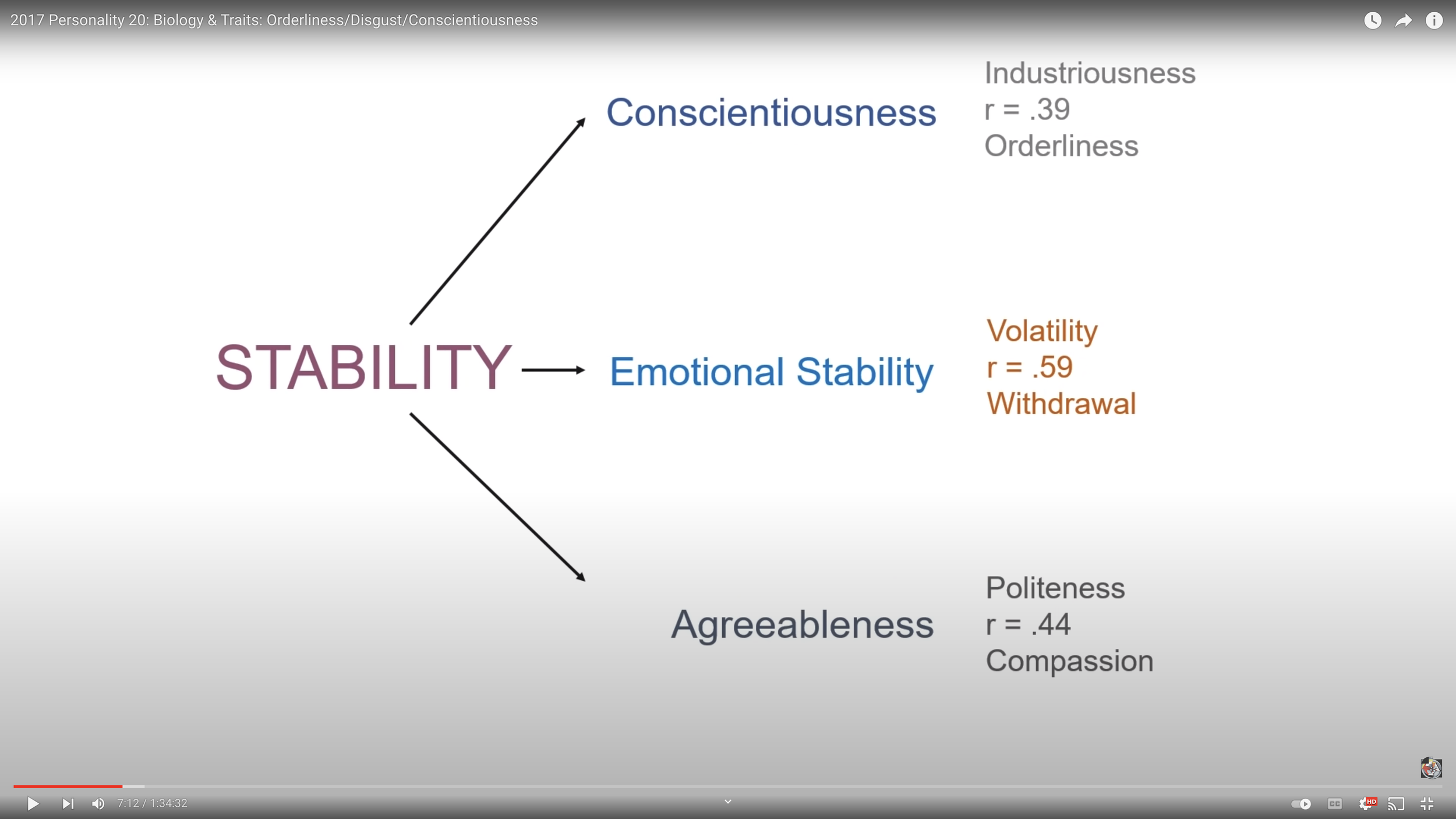Jordan Peterson And The Big Five Personality Test: A Deeper Dive
Ever wondered what makes Jordan Peterson tick? Or why his take on personality traits matters so much? Well, buckle up, because we're diving deep into the world of Jordan Peterson and the Big Five Personality Test. This isn't just about numbers or graphs; it's about understanding the human psyche through the lens of one of the most polarizing figures in modern psychology.
Peterson's work often revolves around the idea of personal responsibility, but what drives these beliefs? The Big Five Personality Test could hold some answers. It's like peeling back the layers of an onion, where each layer reveals something new about how we think, act, and interact with the world. And guess what? It's not just about Jordan Peterson—it's about you too.
So, whether you're a fan or a skeptic, this article aims to shed light on the fascinating intersection between Jordan Peterson's philosophy and the Big Five Personality Test. Think of it as a psychological journey that might just change how you see yourself and others. Ready to explore?
- Joji News The Latest Buzz On Your Favorite Music Sensation
- Us Military Height And Weight Requirements The Full Breakdown You Need To Know
Here's a quick roadmap to help you navigate:
- Biography of Jordan Peterson
- What is the Big Five Personality Test?
- Jordan Peterson's Take on the Big Five
- Understanding the Five Traits
- The Science Behind the Test
- Real-World Applications
- Criticisms and Controversies
- Comparing the Big Five to Other Models
- The Future of Personality Testing
- Wrapping It All Up
Biography of Jordan Peterson
Jordan Peterson is more than just a name; he's a phenomenon. Born on June 12, 1962, in Alberta, Canada, Peterson's journey into psychology began at an early age. With a curious mind and a penchant for challenging the status quo, he quickly rose to prominence as a professor, clinical psychologist, and public intellectual.
But let's not forget the basics. Here's a quick snapshot:
- Ynw Melly Vs Kendrick Lamar The Untold Story Behind The Beef
- Meet The Legends Actors On The Jeffersons Who Shaped Tv History
| Full Name | Jordan Bernt Peterson |
|---|---|
| Date of Birth | June 12, 1962 |
| Place of Birth | Alberta, Canada |
| Profession | Clinical Psychologist, Professor, Author |
| Notable Works | "12 Rules for Life," "Maps of Meaning" |
Now that we've got the basics down, let's dive into what really makes Peterson stand out—his take on personality and the Big Five.
What is the Big Five Personality Test?
The Big Five Personality Test is like the Swiss Army knife of psychology. It's a framework that breaks down personality into five core traits: Openness, Conscientiousness, Extraversion, Agreeableness, and Neuroticism—or OCEAN, if you're into acronyms. These traits help us understand how people differ in their behavior and thought processes.
But why does this matter? Well, because personality isn't just some abstract concept. It influences everything from career choices to relationships. And when you're talking about someone like Jordan Peterson, who spends a lot of time dissecting human behavior, the Big Five becomes a pretty big deal.
Jordan Peterson's Take on the Big Five
Peterson doesn't just nod and agree with the Big Five; he dives deep into its implications. For him, understanding these traits isn't just about labeling people—it's about empowering them. He argues that knowing your strengths and weaknesses can help you navigate life's complexities more effectively.
Take Conscientiousness, for example. Peterson often emphasizes the importance of discipline and responsibility, which aligns perfectly with this trait. Or consider Openness—Peterson's love for exploring new ideas and challenging conventions makes him a poster child for this characteristic.
Understanding the Five Traits
Let's break it down further. Each trait in the Big Five offers a unique window into human behavior. Here's a quick rundown:
- Openness: This is all about curiosity and a willingness to embrace new experiences. Think of it as the "explorer" trait.
- Conscientiousness: Discipline, organization, and responsibility are the hallmarks here. It's like having an internal GPS that keeps you on track.
- Extraversion: This trait is all about energy and social interaction. Extraverts thrive in social settings, while introverts might need a little more downtime.
- Agreeableness: If you're a people pleaser or someone who values harmony, this one's for you. It's about cooperation and empathy.
- Neuroticism: This trait deals with emotional stability. High neuroticism can mean more stress and anxiety, while low neuroticism often equates to calmness.
Now, imagine Jordan Peterson discussing these traits. He might talk about how understanding them can help you make better decisions or improve your relationships. It's like having a roadmap for your personality.
The Science Behind the Test
But wait, there's more. The Big Five isn't just some random theory; it's backed by decades of research. Studies have shown that these traits remain relatively stable over time and can predict everything from job performance to life satisfaction.
For instance, a study published in the Journal of Personality and Social Psychology found that conscientiousness is strongly linked to career success. Meanwhile, high levels of agreeableness can lead to better relationships, while low neuroticism often equates to greater emotional well-being.
So, when Jordan Peterson talks about the importance of personal responsibility, he's not just spouting off random ideas—he's drawing on a wealth of scientific evidence.
Real-World Applications
But how does all this theory translate into real life? Let's take a look at some practical applications:
- Career Guidance: Understanding your traits can help you choose a career that aligns with your strengths. For example, someone high in openness might thrive in creative fields, while someone high in conscientiousness might excel in structured environments.
- Relationships: Knowing your partner's traits can improve communication and reduce conflict. If they're high in agreeableness, they might value harmony more than someone who's low in this trait.
- Personal Growth: Identifying areas where you might be lacking can help you focus on self-improvement. For instance, if you're low in conscientiousness, you might work on building better habits.
And let's not forget Jordan Peterson's emphasis on personal responsibility. By understanding your traits, you can take ownership of your life in a more meaningful way.
Criticisms and Controversies
Of course, no theory is perfect, and the Big Five is no exception. Critics argue that it oversimplifies the complexity of human personality. Others point out that cultural differences can influence how traits manifest, which the test might not fully capture.
Then there's Jordan Peterson himself, who's no stranger to controversy. Some critics accuse him of cherry-picking data to support his arguments, while others praise him for bringing psychological concepts to a wider audience.
But here's the thing: criticism is part of the process. It pushes us to think critically and refine our understanding of the world. And when it comes to personality testing, that's a good thing.
Comparing the Big Five to Other Models
Now, let's compare the Big Five to other personality models. You might have heard of the Myers-Briggs Type Indicator (MBTI) or the Enneagram. While these models offer different perspectives, they often overlap with the Big Five in some ways.
For example, the MBTI's "Thinking" and "Feeling" dimensions align somewhat with the Big Five's Agreeableness trait. Meanwhile, the Enneagram's focus on core motivations can complement the Big Five's emphasis on observable behaviors.
But what sets the Big Five apart is its scientific foundation. Unlike some other models, it's rooted in empirical research, which gives it more credibility in academic circles.
The Future of Personality Testing
So, where does the Big Five go from here? As technology advances, we might see new ways of measuring personality traits. Imagine AI-powered tests that adapt to your responses in real-time or virtual reality simulations that assess how you handle stress.
And what about Jordan Peterson? Will he continue to influence the field of psychology? Only time will tell, but one thing's for sure: his ideas have sparked conversations that will resonate for years to come.
Wrapping It All Up
In conclusion, the intersection between Jordan Peterson and the Big Five Personality Test offers a fascinating glimpse into the human psyche. Whether you're exploring your own traits or trying to understand others, this framework provides valuable insights.
So, what's next? Why not take the test yourself? Or share this article with a friend and start a conversation. After all, understanding personality isn't just about knowledge—it's about connection.
And remember, the journey doesn't end here. Keep exploring, keep questioning, and most importantly, keep growing. Because at the end of the day, that's what Jordan Peterson's message is all about—becoming the best version of yourself.
- What Drops Tissue Samples In Terraria A Comprehensive Guide For Hardcore Gamers
- Meet The Legends Actors On The Jeffersons Who Shaped Tv History

Help me dive really deep into the meaning of my results for Jordan

Miles's Personality in 10 Facets of the Big Five — Confessions of a

Jordan Peterson 5 Personality Types Top Sellers